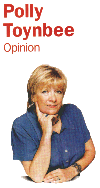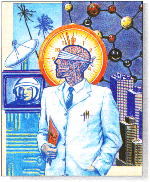
Polly Toynbee
Faith in Science
What hope have we left, now religion
is all but dead and socialism turned to ashes? (Yes, I know there are
still plenty of believers left, but across the broad swathe of society they
are the exception, not the rule.) Yet there is one belief that most of us
still share just. Perhaps some of us cling to it with ever-greater fervour,
for lack of anything else. It is a belief in man's infinite ingenuity, our
forward progress, our capacity in the end to overcome any obstacle, to solve
any problem and rescue ourselves at the eleventh hour. In other words,we
place ultimate faith in science as our saviour.
This
week,Horizon (Monday BBC2) celebrates
its 30th anniversary with a philosophical look back at the expectations,
beliefs, achievements and failures of science. In the many programmes since
1964, the world has changed much, but not often in the ways predicted by
the scientists and futurologists featured at the time. Marshall McLuhan was
right about the communications revolution and the global village, but he
may have been far too optimistic about how much good it would do for people.
His idea that every denizen of the Third World sitting under a tree watching
TV would thus be empowered to participate in the world they see was a step
too far.
As a handful of media moguls dominate
the world's airwaves, there is little sign yet of interaction on the part
of the passive receivers, or an increased sense of belonging to the rest
of the world. In the year that Horizon hit the airwaves, Harold Wilson won
an election promising that the white heat of technology would provide every
answer. Herman Kahn declared that 90 per cent of the world would be as rich
as the Americans before long. Little sign yet of that. Richard Nixon proclaimed
cancer would be cured in ten years. Not yet.
In the 60s, they said energy would become
too cheap to be worth metering. They planned and built rational cities Le
Corbusier's "shining cities in the sky". Now they are knocking them down
as fast as they can afford. When man landed on the moon there seemed
nothing beyond his reach. By the 70s, many of the dreams and much of the
trust in science came to a juddering halt The Vietnam war showed a new generation
two things: first, that science delivered horrifying napalm, Agent Orange
defoliants and a threat of nuclear holocaust. Second, it didn't work, and
the black pyjama-ed Viet Cong on their bicycles were beating Western technology.
Passionate, if wrong- headed, conviction
was stronger even than chemical weaponry. Science was not, after all, invincible.
This anniversary programme tries to lay to rest the wearisome arguments about
science versus culture, with a plea for people
to understand there is no difference between the two. We are, we live, we
breathe the science of our age, just as we wear its fashions, read its books
and go to its movies. Even if most people don't have the scientific training
to understand Heisenberg' s Uncertainty Principle
or Einstein's Theory of Relativity , nor to imagine
what a black hole IS, in a curious way the style
of thought, the essence of the idea filters down and changes us.
 To
prove it's true, a new popular science series, Big Bang, starts on Wednesday
(Radio 4),part of the push for more science programmes. That science is rooted
in culture, and vice versa, becomes obvious when viewing some Horizons of
yesteryear and wincing at some of their attitudes. Much airtime is given
to solving the problems of the developing world, with an arrogant belief
in our own rationality and the ignorance of the primitives.
To
prove it's true, a new popular science series, Big Bang, starts on Wednesday
(Radio 4),part of the push for more science programmes. That science is rooted
in culture, and vice versa, becomes obvious when viewing some Horizons of
yesteryear and wincing at some of their attitudes. Much airtime is given
to solving the problems of the developing world, with an arrogant belief
in our own rationality and the ignorance of the primitives.
Thousands of experts in millions of villages
will tell women that their mother was a bad mother, that their father was
a bad father and the old ways were bad ways," it thundered away in the 60s,
not just imperialistic, but so sublimely confident in Western solutions to
everything. As experts swing from panic about a new ice age to alarm at
global warming; as we watch the two warring groups
of population experts slug it out about whether or not there will be an explosion
of mouths we cannot feed, we should, perhaps, have less
blind faith in scientists.
Yet we live in a world where we are more
and more dependent on and therefore deferential towards
"experts" of every kind. Democratic participation
in decision-making becomes harder and harder as expert knowledge is held
in just a few hands and decisions turn on things most people can no longer
understand. The brave new world may increasingly be one we observe and live,
but no longer control, if we ever did.